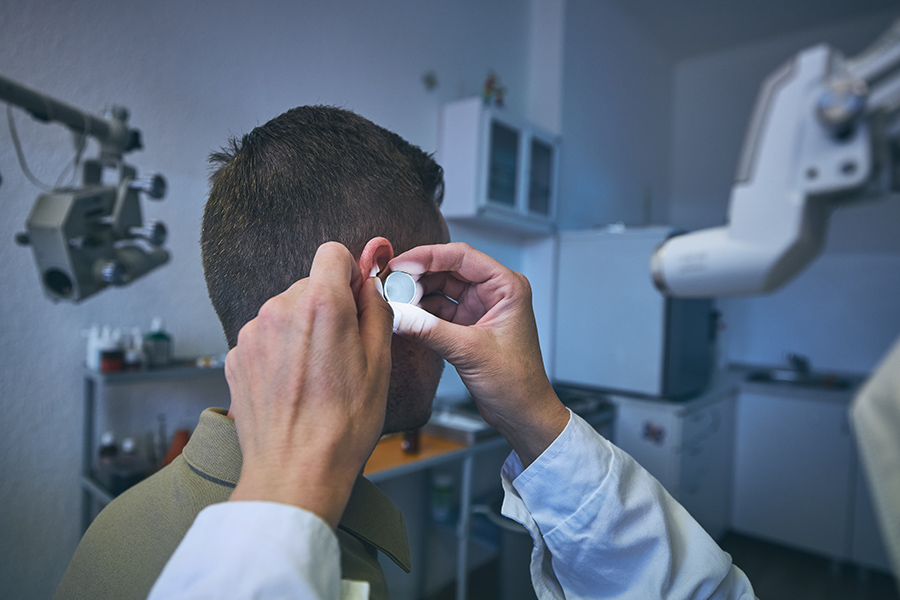Introduction
Meningitis is a serious infection
Meningitis is a serious infection that causes inflammation of the membranes that cover the brain and spinal cord. It can be caused by bacteria, viruses, fungi, or parasites. Meningitis can have serious complications, such as brain damage, seizures, and death. One of the most common and devastating complications of meningitis is hearing loss.
Hearing loss can affect up to 50% of people who have bacterial meningitis, and up to 25% of those who have viral meningitis. Hearing loss can occur within days or months after the infection, and it is often permanent. Hearing loss can have a profound impact on your child’s development, communication, education, and quality of life.
Fortunately, there are ways to prevent meningitis and its complications. In this blog post, we will discuss some of the causes, symptoms, diagnosis, treatment, and prevention of meningitis and hearing loss. We will also provide some tips on how to support your child if they have hearing loss due to meningitis.
What causes meningitis and hearing loss?
Meningitis can be caused by different types of germs that enter the bloodstream and travel to the brain and spinal cord. The most common causes of meningitis are:
• Bacteria: These include Streptococcus pneumoniae, Neisseria meningitidis, Haemophilus influenzae type b (Hib), and Listeria monocytogenes. Bacterial meningitis is more severe and more likely to cause hearing loss than viral meningitis. It requires immediate antibiotic treatment.
• Viruses: These include enteroviruses, herpes simplex virus, mumps virus, measles virus, and influenza virus. Viral meningitis is usually milder and more common than bacterial meningitis. It usually resolves on its own without specific treatment.
• Fungi: These include Cryptococcus neoformans, Candida albicans, Histoplasma capsulatum, and Coccidioides immitis. Fungal meningitis is rare and mostly affects people with weakened immune systems. It requires antifungal treatment.
• Parasites: These include Toxoplasma gondii, Taenia solium, Angiostrongylus cantonensis, and Schistosoma mansoni. Parasitic meningitis is also rare and mostly affects people who travel to or live in endemic areas. It requires antiparasitic treatment.
Hearing loss can occur as a result of damage to the inner ear or the auditory nerve due to inflammation or infection. The exact mechanism of how meningitis causes hearing loss is not fully understood, but some possible factors are:
• Bacterial toxins: Some bacteria produce toxins that can damage the hair cells or nerve cells in the inner ear that are responsible for converting sound waves into electrical signals.
• Immune system response: The body’s immune system may produce antibodies or inflammatory molecules that can cross-react with the inner ear structures or nerve cells and cause damage.
• Reduced blood flow: The inflammation or infection may reduce the blood flow to the inner ear or nerve cells and deprive them of oxygen and nutrients.
• Medications: Some antibiotics that are used to treat bacterial meningitis may have ototoxic effects, meaning they can harm the inner ear or nerve cells.
What are the symptoms of meningitis and hearing loss?
The symptoms of meningitis may vary depending on the age of the person and the type of germ that causes it. However, some common symptoms are:
• Fever
• Headache
• Stiff neck
• Nausea or vomiting
• Confusion or trouble concentrating
• Seizures
• Sleepiness or trouble waking up
• Sensitivity to light
• No appetite or thirst
• Skin rash in some cases
The symptoms of hearing loss may also vary depending on the degree and type of hearing loss. However, some common signs are:
• Difficulty hearing sounds or speech
• Asking others to repeat themselves or speak louder
• Turning up the volume of TV or radio
• Withdrawing from conversations or social situations
• Not responding to sounds or voices
• Delayed speech or language development in children
It is important to seek medical attention as soon as possible if you or your child have any symptoms of meningitis or hearing loss. Early diagnosis and treatment can prevent serious complications and improve outcomes.
How are meningitis and hearing loss diagnosed?
Meningitis is diagnosed by performing a
lumbar puncture, which is a procedure that involves inserting a needle into the lower back and drawing out some cerebrospinal fluid (CSF). The CSF is then tested for the presence of germs or other substances that indicate inflammation. A lumbar puncture can also help relieve pressure in the brain caused by meningitis.
Hearing loss is diagnosed by performing a hearing test, which is a procedure that involves measuring how well a person can hear different sounds and frequencies. A hearing test can be done by an audiologist, who is a health professional who specializes in hearing and balance disorders. A hearing test can determine the type, degree, and configuration of hearing loss.
How are meningitis and hearing loss treated?
Meningitis is treated according to the type of germ that causes it. The main treatments are:
• Antibiotics: These are medicines that kill bacteria. They are given intravenously (through a vein) for bacterial meningitis. They may also be given intrathecally (into the spinal canal) for some cases of severe or resistant bacterial meningitis. Antibiotics may also prevent some cases of viral meningitis caused by certain viruses, such as herpes simplex virus or mumps virus.
• Antivirals: These are medicines that stop viruses from multiplying. They are given orally (by mouth) or intravenously for viral meningitis caused by certain viruses, such as herpes simplex virus or influenza virus.
• Antifungals: These are medicines that kill fungi. They are given orally or intravenously for fungal meningitis.
• Antiparasitics: These are medicines that kill parasites. They are given orally or intravenously for parasitic meningitis.
• Corticosteroids: These are medicines that reduce inflammation and swelling. They are given intravenously for some cases of bacterial or viral meningitis to prevent or reduce hearing loss and other complications.
• Fluids and electrolytes: These are substances that help maintain hydration and balance in the body. They are given intravenously for people who have dehydration, shock, or low blood pressure due to meningitis.
• Pain relievers: These are medicines that reduce pain and fever. They are given orally or intravenously for people who have headache, fever, or discomfort due to meningitis.
QUIZ - SYMPTOMS OF HEARING LOSS
Hearing loss is treated according to the degree and type of hearing loss. The main treatments are:
• Hearing aids: These are devices that amplify sounds and deliver them to the ear. They are worn behind or inside the ear. They can help people with mild to moderate hearing loss hear better in various situations.
• Cochlear implants: These are devices that bypass the damaged part of the inner ear and stimulate the auditory nerve directly. They consist of an external part that captures sounds and converts them into electrical signals, and an internal part that is surgically implanted under the skin behind the ear and delivers the signals to the nerve. They can help people with severe to profound hearing loss hear sounds and speech.
• Auditory brainstem implants: These are devices that bypass both the inner ear and the auditory nerve and stimulate the brainstem directly. They consist of an external part that captures sounds and converts them into electrical signals, and an internal part that is surgically implanted on the surface of the brainstem and delivers the signals to the brain. They can help people with no functioning auditory nerve hear some sounds.
• Bone-anchored hearing systems: These are devices that transmit sounds through bone conduction. They consist of an external part that captures sounds and converts them into vibrations, and an internal part that is surgically attached to the skull bone behind the ear and delivers the vibrations to the inner ear. They can help people with conductive hearing loss or single-sided deafness hear better on the affected side.
• Assistive listening devices: These are devices that enhance hearing in specific situations, such as watching TV, talking on the phone, or listening in noisy environments. They include personal amplifiers, FM systems, infrared systems, induction loop systems, captioned phones, and captioned TV.
• Communication strategies: These are techniques that improve communication between people with hearing loss and their communication partners. They include speaking clearly and slowly, facing each other, using gestures and facial expressions, reducing background noise, choosing well-lit places, confirming understanding, asking for repetition or clarification, and using written notes if needed.
• Speech-language therapy: This is a service that helps people with hearing loss develop or improve their speech, language, and communication skills. It may include speech reading (lip reading), auditory training (listening skills), speech production (articulation), language comprehension (understanding
words), and language expression (vocabulary and grammar).
• Sign language therapy: This is a service that helps people with hearing loss learn or improve their sign language skills. Sign language is a visual language that uses hand shapes, movements, facial expressions, and body language to communicate. There are different types of sign language, such as American Sign Language (ASL), British Sign Language (BSL), and Auslan (Australian Sign Language).
• Auditory-verbal therapy: This is a service that helps children with hearing loss develop spoken language skills through listening and speech. It involves using hearing devices, such as hearing aids or cochlear implants, to maximize the child’s access to sounds and speech. It also involves coaching the parents or caregivers on how to stimulate the child’s listening and speaking abilities in daily activities.
• Auditory-oral therapy: This is a service that helps children with hearing loss develop spoken language skills through listening, speech, and speech reading. It involves using hearing devices, such as hearing aids or cochlear implants, to maximize the child’s access to sounds and speech. It also involves teaching the child how to use visual cues, such as lip movements and facial expressions, to supplement their listening skills.

Navigating Pulsatile Tinnitus in Seniors: Insights and Effective Management
Navigating pulsatile tinnitus in seniors requires a tailored approach that considers both insights and effective management strategies. As individuals age, their auditory health may become more complex, necessitating specialized care.

Navigating Pulsatile Tinnitus in Adults: Insights and Treatment Strategies
Navigating pulsatile tinnitus in adults requires a nuanced approach that combines insights and treatment strategies. From understanding the underlying causes to exploring effective
How can meningitis and hearing loss be prevented?
The best way to prevent meningitis and hearing loss is to avoid getting infected by the germs that cause meningitis. This can be done by:
• Vaccination: Vaccines are safe and effective ways to protect yourself and your child from some of the most common and dangerous types of meningitis. There are vaccines available for meningococcus, pneumococcus, Hib, mumps, measles, influenza, and varicella (chickenpox). Some of these vaccines are part of the routine immunization schedule for children and adolescents. Others may be recommended for certain groups of people who are at higher risk of meningitis, such as travelers, college students, military personnel, or people with certain medical conditions. Talk to your doctor about which vaccines you or your child need and when to get them.
• Hygiene: Practicing good hygiene can help prevent the spread of germs that cause meningitis. This includes washing your hands frequently with soap and water or using alcohol-based hand sanitizer; covering your mouth and nose when you cough or sneeze; avoiding sharing personal items such as cups, utensils, toothbrushes, or cigarettes; and staying home when you are sick.
• Prophylaxis: Prophylaxis is the use of antibiotics to prevent infection in people who have been exposed to someone with meningitis. This may be recommended for close contacts of someone who has bacterial meningitis, such as household members, classmates, or co-workers. Prophylaxis should be started as soon as possible after exposure and completed according to the doctor’s instructions.
• Screening: Screening is the testing of pregnant women for group B streptococcus infection before delivery. This can help prevent newborn babies from getting infected by this bacterium during birth. If a pregnant woman tests positive for group B streptococcus, she will be given antibiotics during labor to reduce the risk of passing the infection to her baby.
The best way to prevent hearing loss due to meningitis is to diagnose and treat meningitis early and effectively. This can be done by:
• Seeking medical attention: If you or your child have any symptoms of meningitis or hearing loss, do not delay seeking medical attention. Early diagnosis and treatment can save lives and prevent complications.
• Following treatment: If you or your child are diagnosed with meningitis, follow the doctor’s instructions on how to take the prescribed medicines and how long to take them. Do not stop taking the medicines without consulting your doctor. Also follow up with your doctor regularly to monitor your recovery and check for any signs of complications.
• Testing hearing: If you or your child have had meningitis, it is important to test your hearing as soon as possible after recovery. This can help detect any hearing loss that may have occurred due to meningitis and start appropriate treatment if needed. Hearing tests should be repeated at regular intervals after meningitis to monitor any changes in hearing status.
How can you support your child with hearing loss due to meningitis?
If your child has hearing loss due to meningitis, you may feel overwhelmed by the challenges they face. However, there are many ways you can support your child and help them achieve their full potential. Some of these ways are:
• Seeking professional help: Your child will need a team of professionals who can provide them with the best care and services for their hearing loss. This may include an audiologist,
a speech-language therapist, a sign language therapist, an auditory-verbal therapist, an auditory-oral therapist, a teacher of the deaf, a psychologist, a social worker, and an ear-nose-throat (ENT) specialist. These professionals can assess your child’s hearing and communication needs and provide them with appropriate treatment and services. They can also guide you on how to access funding and resources for your child’s hearing devices and education.
• Choosing an educational setting: Your child will need an educational setting that can meet their learning and communication needs. There are different options available, such as mainstream schools, special schools, or home schooling. You can choose the option that best suits your child’s preferences and abilities. You can also consult with your child’s teacher and professionals on how to support your child’s learning and development in school.
• Providing emotional support: Your child may experience different emotions due to their hearing loss, such as sadness, anger, frustration, or isolation. They may also face challenges such as bullying, low self-esteem, or social difficulties. You can help your child cope with these emotions and challenges by providing them with love, acceptance, encouragement, and understanding. You can also help them build their confidence and resilience by celebrating their strengths and achievements, involving them in activities they enjoy, and connecting them with peers who have similar experiences.
• Seeking family support: You may also need support as a parent of a child with hearing loss. You may have feelings of grief, guilt, stress, or anxiety. You may also face challenges such as financial difficulties, relationship issues, or lack of information. You can seek support from your family, friends, community, or other parents who have a child with hearing loss. You can also join support groups or organizations that offer information, advice, advocacy, and resources for families of children with hearing loss.
Conclusion
Meningitis is a serious infection that can cause hearing loss in up to 50% of people who have it. Hearing loss can affect your child’s development, communication, education, and quality of life. However, there are ways to prevent meningitis and its complications by getting vaccinated, practicing good hygiene, seeking medical attention early, and following treatment. There are also ways to treat hearing loss by using hearing devices, communication strategies, and speech-language therapy. There are also ways to support your child with hearing loss by seeking professional help, choosing an educational setting, providing emotional support, and seeking family support.
If you or your child have any symptoms of meningitis or hearing loss, do not hesitate to contact your doctor or go to the hospital. Early diagnosis and treatment can save lives and prevent complications.






